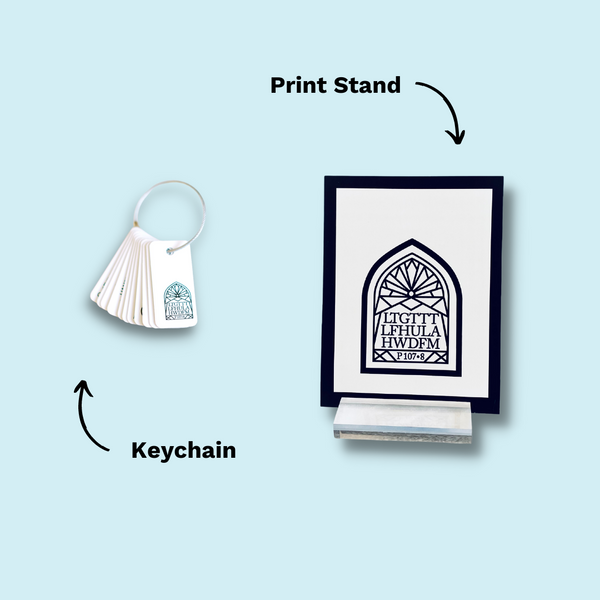"Religion that God our Father accepts as pure and faultless is this: to look after orphans and widows in their distress and to keep oneself from being polluted by the world." — James 1:27
Religion.
It’s a word that can carry a whole lot of baggage, both inside and outside the church. I’ve heard Christians denounce religion as mere empty duty, saying things like, “I don’t have a religion, I have a relationship with God.” I’ve also heard people outside of the church blame religion as the root of so much strife and war in the world. Others accuse religion of the reverse—saying it’s the “the opiate of the people” (Karl Marx), or the very thing keeping people asleep to the real problems in the world. I’ve also had people tell me they don’t have a problem with God, just with religion. And yet, somehow, God doesn’t have a problem with religion (at least not true religion). James 1:27 tells us that there is a “pure and faultless” religion, one that God himself accepts from us as worshipful.
But what would that kind of religion look like?
Astonishing? Inviting? Not empty duty, but vibrant and engaged? What if this pure religion was the very thing building bridges instead of blowing them up? What if it was wide awake and engaged in solving the problems of the world and loving the people in it? What if it looked so much like God himself that people couldn’t claim to love God and hate the practice of his people? This is the kind of religion that not only God accepts, but is so undeniably wondrous that nay-sayers have nothing to say. This kind of pure and faultless religion is not too good to be true, it’s possible. And we know that because it’s mandated for all of us who follow Jesus.
Do the thing!
The book of James (where we find our verse) is a wake-up call for the church to practice our faith in a way that pleases and reflects God. James summarizes his point emphatically, saying, “Do not merely listen to the word, and so deceive yourselves. Do what it says” (James 1:22, get free resources to memorize it here). Yikes! Was that what the church was doing—merely giving lip-service to God, but not doing what he said? It’s a question we need to grapple with too! How is our practice out of sync with our beliefs? In what areas have we gotten swept away by other priorities or by our own selfishness? In what ways are we deceiving ourselves? We need the wake-up call in James 1:22 to help us see where we’re falling short—where our practice isn’t living up to our profession.
And we need marching orders!
James gives us a ton of them in his book. He tells us to get rid of all moral filth, to not play favorites, and to not be envious or selfishly ambitious. Instead, he calls us to be patient in affliction and to tame our tongues, among other things. James is imploring us “to humbly accept the word planted in [us]” (James 1:21) and to “do what it says” (James 1:22). One of his practical, succinct encouragements is our memory verse, James 1:27, which tells us, “Religion that God our Father accepts as pure and faultless is this: to look after orphans and widows in their distress and to keep oneself from being polluted by the world.” James gives us both external and internal ways of practicing pure and faultless religion. Let’s look at them each briefly in turn.
Faultless External Religion = Helping the Helpless
Pure and faultless religion looks like caring for “orphans and widows in their distress." The call in our verse feels really specific, doesn’t it? Why just widows and orphans? In biblical times orphans and widows were in constant distress—they had no status, no prospects, no means of earning income, and were totally dependent on the generosity of others. This call to care for the easily overlooked is inherently a call to care about all people, but especially the ones who need the most care.
To think in modern terms, caring for “orphans and widows” looks like seeing the overlooked, helping the destitute, including the outsiders, and wanting the unwanted. To be clear, it’s not less than caring for orphans and widows, but we see throughout Scripture that one of the ways we worship and honor our God is to help the helpless. More than that, isn’t it one of the most beautiful ways we can reflect him and his values in the world? When we help those who cannot pay us back, we look like our gospel-giving God who rescues and loves us even though we could never pay him back either. (For a deeper dive into this concept and the surrounding verse, listen to this Wednesday’s Dwell Differently Podcast.)
Faultless Internal Religion = An Uncorrupted Heart
The second command in our verse dovetails perfectly with our first command. When we love the marginalized, the helpless, the unwanted, we’re flipping the world and its priorities on its head. The world tells us to look out for number one—get wealth, get status, get power, get stuff, get success, get glory. Yet, how can we be polluted by those things when we are actively giving them away to others, people who have no wealth or status or power? Practicing our religion externally is one of the very things that bolsters our faith internally. It keeps us from being polluted by the world around us and frees us to love our God wholeheartedly.
This is the kind of religion I want! Don’t you?
So, here’s my challenge for you (and me) this month as we begin to consider whether our religion looks like our professed beliefs: How well are you loving others (especially those who are marginalized or at risk)? What’s one practical step you could take in this regard? How are you being polluted by the world? What’s one thing you could give up?
And for the rest of the month: Stick around! We’ll be diving more and more into the verse this month, considering the real-life implications of true religion—both in the way we care for the vulnerable and how we live in the world without being worldly.




